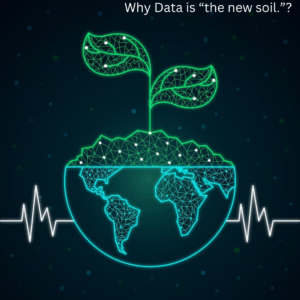Introduction
In today’s digitally driven world, data has taken on a role that can be compared to that of soil in agriculture. Just as soil is essential for nourishing plants and enabling growth, data has become the foundation upon which innovation and progress flourish. This analogy, often attributed to Clive Humby, holds true as data has transformed the way businesses, governments, and individuals operate. In this blog post, we will explore five compelling reasons why data is rightly referred to as “the new soil.”

Nurtures Innovation: Just as fertile soil provides the nutrients necessary for plants to thrive, data serves as the fuel for innovation. The wealth of information collected from various sources allows businesses and researchers to analyze patterns, identify trends, and generate insights that lead to groundbreaking innovations. From developing cutting-edge technologies to revolutionizing industries, data-driven insights pave the way for progress like never before.
Cultivates Growth: Much like plants need fertile soil to grow, businesses require data to expand and flourish. Data-driven decision-making provides organizations with a deep understanding of their customers’ preferences, market trends, and operational efficiency. Armed with this knowledge, businesses can tailor their strategies, improve customer experiences, and make informed decisions that drive growth and success.
Also Read: The Significance of Consumer Research: Unveiling Insights for Business Success
Yields Valuable Insights: Just as skilled farmers extract valuable crops from well-maintained soil, analysts and data scientists extract valuable insights from well-curated data. The intricate analysis of data enables experts to uncover hidden patterns, correlations, and opportunities that might otherwise remain hidden. These insights guide businesses in making precise decisions and predicting future trends with a high degree of accuracy.
Requires Cultivation and Care: Similar to soil requiring proper care and cultivation, data demands responsible management. Clean, accurate, and well-organized data is essential for drawing meaningful conclusions. Just as neglected soil can lead to poor yields, neglecting data quality can result in inaccurate analyses and misguided decisions. Proper data governance, security, and quality control are paramount to ensure the integrity of the insights derived.
Fuels Digital Transformation: In the modern age, data fuels the engine of digital transformation. Businesses are shifting towards data-driven operations, leveraging automation, artificial intelligence, and machine learning to optimize processes, personalize experiences, and streamline operations. The availability of vast amounts of data has enabled the development of sophisticated algorithms that power everything from recommendation systems to self-driving cars.
Conclusion
As Clive Humby’s analogy suggests, data is indeed “the new soil” in our digital landscape. It provides the nutrients needed for innovation, growth, and transformative change. From nurturing creativity to yielding valuable insights, the parallels between data and soil are striking. Recognizing the value of data and adopting strategies for its responsible management will undoubtedly allow businesses and societies to reap the bountiful harvest of opportunities that lie ahead. Just as a farmer tends to their soil, organizations must tend to their data if they intend to thrive in this data-driven era.


